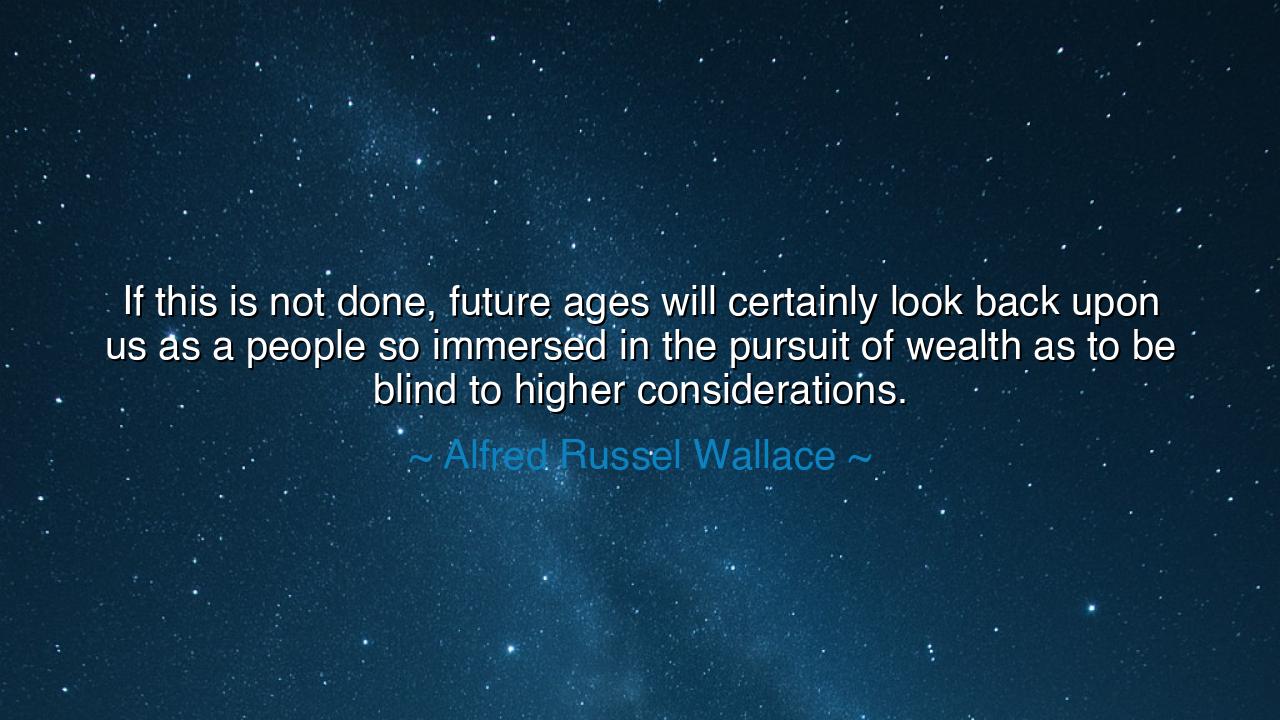
If this is not done, future ages will certainly look back upon us
If this is not done, future ages will certainly look back upon us as a people so immersed in the pursuit of wealth as to be blind to higher considerations.






In the ancient halls of wisdom, the sages often spoke of a great truth: that the pursuit of wealth and material gain should never overshadow the higher callings of the spirit and the soul. Alfred Russel Wallace, a man of deep insight, warns us of a perilous future: "If this is not done, future ages will certainly look back upon us as a people so immersed in the pursuit of wealth as to be blind to higher considerations." These words are a reminder to all who seek greatness through the acquisition of material wealth, for they are a cautionary tale about the dangers of losing sight of the greater purpose in life—the pursuit of wisdom, virtue, and humanity.
The ancient Greeks understood this concept well. Their philosophers—Socrates, Plato, and Aristotle—warned that a life lived solely for material gain was one of ignorance and short-sightedness. The pursuit of wisdom, they argued, must always come before the pursuit of gold. Socrates, in particular, spoke often of the danger of being consumed by desires that led people away from the path of virtue. He believed that true happiness came not from wealth or power, but from a life of self-reflection, understanding, and the search for higher truths. Wallace’s words echo this ancient wisdom, warning against the blindness that comes from an overemphasis on wealth and material success.
Consider the fates of the great empires of old, empires that reached the height of power and wealth, yet collapsed under the weight of their greed and corruption. The Roman Empire is perhaps the most telling example. At its height, it ruled over vast lands, its coffers overflowing with the spoils of war and conquest. Yet, it is said that the empire's fall was not due to external forces alone, but because it became too absorbed in its material wealth and the luxury of its rulers. The Romans forgot the higher principles of justice, honor, and virtue, and their society became blind to the dangers of excess. In this way, their downfall serves as a warning to future generations, one that mirrors Wallace's reflection on our own time.
Wallace’s statement is also a reflection on the nature of progress. He understood that the future would judge us not by the amount of wealth we accumulated, but by the way in which we used that wealth to advance the greater good of society. Industrialization and the advancement of science have brought us immense material wealth, but at what cost? Are we truly advancing as a civilization, or are we simply chasing the ever-elusive shadow of prosperity, blind to the destruction we may be causing to our environment, our relationships, and our very humanity? The industrial revolution, for example, led to the creation of vast fortunes, but it also brought about the exploitation of workers and the degradation of the environment, leaving behind a legacy that we must now work to undo.
Let us look to the example of Mahatma Gandhi, a man who lived simply, rejecting the materialistic world in favor of spiritual growth and the pursuit of justice. Gandhi’s wisdom was not in amassing wealth but in cultivating moral clarity and compassion. He led a nation to independence not through the accumulation of material power, but through the strength of his character, his unwavering commitment to truth, and his belief in the higher purposes of life. His life serves as a powerful reminder that the pursuit of wealth is not the highest calling; rather, the pursuit of justice, equality, and human dignity should always come first.
The lesson that Wallace imparts is one of balance. While wealth and material success are not inherently wrong, they must never eclipse the greater purposes for which we are all called. The future will judge us not by the size of our bank accounts, but by the legacy we leave behind—the impact we have on the world, the way we treat one another, and the values we uphold. Higher considerations—such as love, wisdom, and justice—must always guide our actions, for it is these things that define the true measure of a people, not the wealth they amass.
Thus, we must ask ourselves: what is our true purpose in this life? Are we so blinded by the pursuit of wealth that we lose sight of the higher purposes that give meaning to our existence? Let us heed Wallace’s words and remember that our legacy will not be defined by how much we own, but by how we have lived, how we have treated others, and how we have contributed to the greater good of all humanity. May we strive to live lives of purpose, where wealth serves not as the end goal, but as a means to elevate and enrich the lives of others, ensuring that we are not blind to the higher considerations of life.






AAdministratorAdministrator
Welcome, honored guests. Please leave a comment, we will respond soon